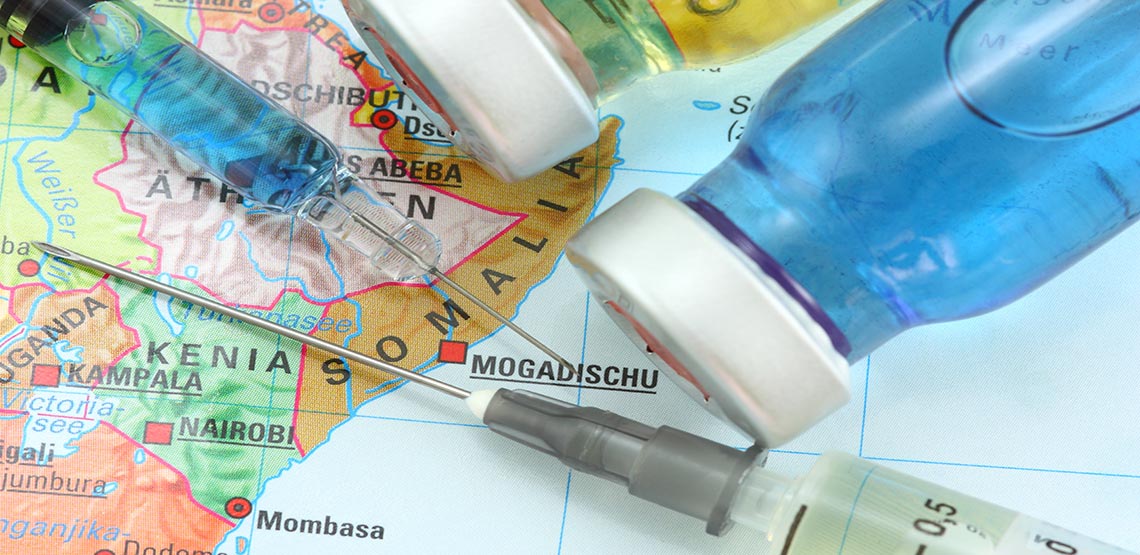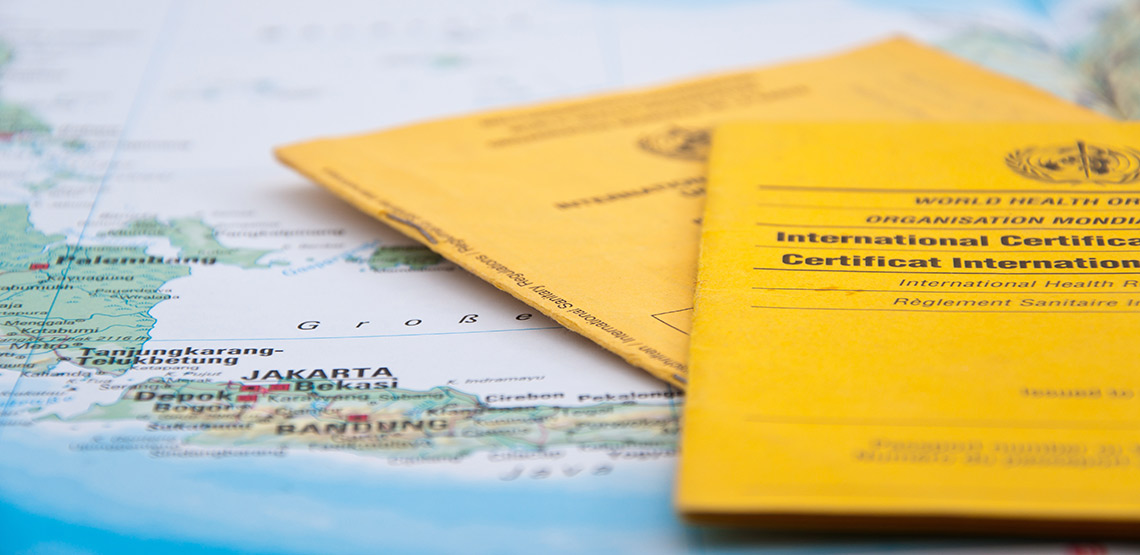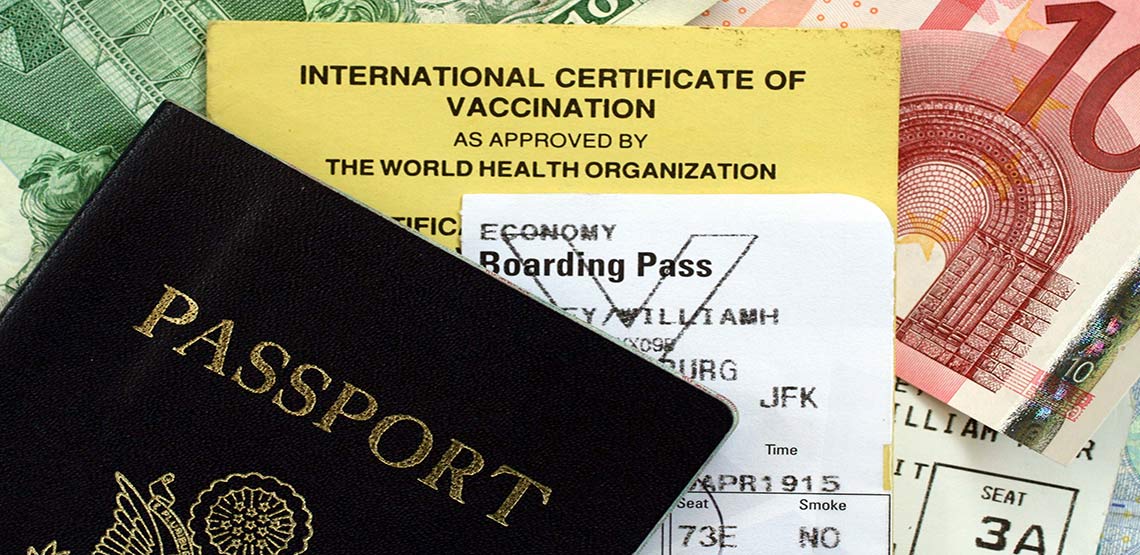Staying Healthy While Traveling
Travel Vaccines and Medications
Nothing can ruin a vacation more than getting sick. If you’re visiting a different country, it’s important to get any necessary travel vaccines and/or medication, such as malaria pills. They can help you avoid serious illnesses while overseas, and are crucial when it comes to travel preparation. Make sure to visit a travel clinic or your local doctor before you leave to get proper treatment.
Do You Need to Get Vaccinations Before You Travel?
There is no one-size-fits-all with travel vaccines and medication. The injections you need will largely depend on your trip itinerary, but also your medical history and other factors.
Details that can influence whether or not you need immunizations include:
- Your destination
- How long you plan to travel for
- Where you’re staying (rural areas tend to have more risk of disease than urban centers)
- Your age and any medical conditions you may have
- Your planned activities during the trip. For example, if you are going to be around animals or volunteer in a medical setting, it might be wise to get more vaccinations
The most reliable way to determine whether you need vaccinations is to visit a travel doctor.
Travel vaccinations are generally divided into three categories: routine, recommended, and required. The only vaccinations that are officially required are the yellow fever vaccine (which you will need to have before you can enter certain sub-Saharan and Latin American countries), and now, COVID vaccinations, which almost every country require. Make sure to double check requirements before you even book a plane ticket!
Routine vaccinations are the ones normally given to you during childhood. These can include diphtheria, tetanus, and measles shots. For these vaccinations, you need to check that you are up to date and whether or not you need a booster shot.
Recommended vaccinations are ones that are advised based on the area you will be traveling to, but are not compulsory. Typhoid, rabies, and Japanese encephalitis are a few of the diseases that are found in specific regions. It is typically a good idea to get these vaccinations.
Malaria Pills
While not a vaccination, malaria pills are common medication that is prescribed for travel if you’re visiting certain areas. Malaria is a disease that humans contract from mosquito bites, and it kills over 400,000 people per year. Most of these deaths occur in people who do not have access to antimalaria medication, and live in areas where the disease is present.
There are different types of antimalaria pills, and you’ll need to discuss the options with a doctor or nurse to find what’s right for you depending on what area you’re visiting, and how long you’ll be there for. Typically, you need to take the tablets before, during, and after traveling, so make sure to follow the prescription properly in order to ensure it works correctly. Depending on what prescription you get, the tablets will be taken daily or weekly; again, this depends on the length of your trip, so do your research and be prepared.
Common Travel Vaccinations
Some common vaccinations for travel you may need include:
Typhoid
A bacterial disease, typhoid causes fever, aches and rashes and is spread through close contact, or contaminated food and water. You’ll probably need this vaccine if you’re traveling to Southeast Asia, the Indian subcontinent, Africa, or Latin America.
Hepatitis A
Hepatitis A is a contagious, viral liver infection spread through contaminated food or water. This vaccine is usually recommended for people traveling to parts of the world where there is a high risk of the disease, as well as poor sanitation and hygiene.
Meningitis
A vaccination against meningococcal meningitis is recommended for anyone traveling to the meningitis belt in Africa, or other locations where the disease is known to occur.
Cholera
A bacterial infection, Cholera is common in developing countries where levels of sanitation and hygiene are poor. This is a common vaccination for people going abroad to do aid work, or for travelers heading to countries where there have been recent outbreaks.
While you may need to lower your standards of cleanliness when in the backcountry, these tips for how to stay clean while backpacking are indispensable.
Yellow Fever
The yellow fever vaccine must be given by an approved clinic. Once you receive the injection, you’ll be given a yellow fever certificate. You may need to present this certificate at passport control in certain African countries, and may be denied entry if you can’t produce it. In most cases the certificate is valid for life, but you may be required to get a booster dose if all of the following apply: you’re traveling to an area where yellow fever is found; you were last vaccinated more than 10 years ago; and when you were last vaccinated you were under two years old, pregnant, or had a weakened immune system.
Rabies
Rabies is common throughout Africa, Asia and Latin America. If you plan on staying more than a month in a location where rabies is present, or intend to work with animals, the rabies vaccine is recommended. While it doesn’t mean you will be immune to the disease, it will make treatment much easier and could save your life.
COVID-19
Now that we have a vaccine for COVID-19, many countries require it. With different vaccines available in different countries, it’s important to check any specific requirements, and have your vaccination record ready to show when boarding a plane, and then entering a new country. It’s also worth doing research on mask mandates and any regional restrictions as well.
How Much Do Travel Vaccinations Cost?
Travel shots aren’t cheap.
The overall cost will depend on your home country and health insurance policy, but an appointment at a specialist clinic usually costs more than a regular doctor — on average between $50 and $100 — and then each vaccination can cost between $10 and $150. Some vaccinations, such as rabies, are very costly and require several doses before you are fully immunized.
First-time travelers typically need two or three vaccines, so make sure to factor this into your trip budget.
Think of your vaccinations as an investment in your health — spending a few hundred dollars now could save you thousands of dollars by avoiding illness when you travel. Some vaccines will also give you immunity for life, so one lump sum will protect you for many more trips to come.
A vaccination against Hepatitis A, for example, will give you protection in all the developing countries you visit.
When Should You Get Travel Vaccinations?
You should start the consultation and vaccination process at least four to six weeks before you travel.
Your body needs time to build up immunity, and some vaccinations can take a toll on your body so it’s better to space them out if you are getting multiple injections. Plus, for vaccines such as rabies you need several injections before you have immunity, so you may need around a month to get all the shots you need.
Even if you don’t have four weeks though, you should check in with a doctor to see if there is anything you need.
Where Can You Get Travel Vaccinations?
The best place to go for travel vaccinations is in a specialist travel clinic. While your GP may be able to advise you on what vaccinations you need, a travel doctor has much more experience in this particular area.
They are also more likely to have the vaccinations on site, so you can have a consultation and injections in one visit. General doctors may have to order more uncommon vaccines, which can take a few weeks.
Yellow fever vaccinations are often only available from specialized centers.








